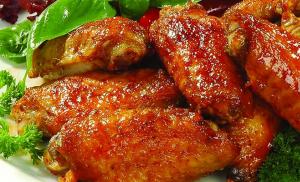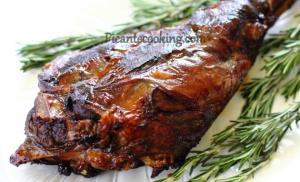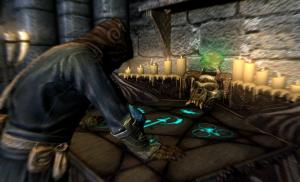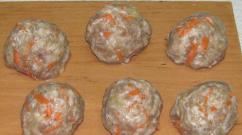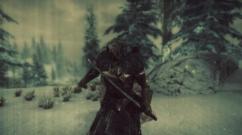An important holiday is approaching in the Orthodox world - the eve of the Nativity of Christ. Christmas Eve
For Orthodox Christians living in Russia, the second most important church holiday is coming - Nativity... The Russian Orthodox Church and other Julian denominations celebrate Christmas from 6 to 7 January... In Russia, January 7 is a day off. Western Christians and Orthodox churches living according to the Gregorian and the coinciding New Julian calendar celebrate Christmas from 24 to 25 December.
Christmas Eve - Christmas Eve
Christmas Eve - Christmas Eve - is a very important day for all Christians. In Russia, Christmas Eve was associated with folk beliefs that still have a pre-Christian nature.
Christmas Eve is celebrated on the evening of January 6th. At this time in Russia it was customary to guess, and in general, many rituals, beliefs and prohibitions were associated with this day, which are still observed.
What is Christmas Eve
The name Christmas Eve comes from the word "sychivo" - it is cereal grains cooked in honey. They broke the fast with this dish after a very strict and long one, on the last day of which it was customary to refuse food altogether until the moment when the first star appeared in the sky, for which the believers took the planet Venus. After the first star appeared in the evening sky, it was possible to break the fast with oozing, and then after the Christmas service, the believers sat down to a festive meal, including meat dishes.
Christmas Eve in Russia was also called Kolyada, since from that time believers (mostly children) walked around the courtyards and sang carols - folk Christmas carols.

Christmastide
From Christmas time came in Russia Christmastide... Christmastide is a week of joy and celebration, when all fasts are canceled and you can eat meat every day.
Christmas Eve and Christmas Eve: Christmas Fortune Telling, Traditions and Prohibitions
Fortune telling in Russia was customary for a limited number of days a year. In winter, fortune-telling was made from the night before Christmas and throughout Christmas time - until Epiphany on January 18 (Epiphany is celebrated on January 19).
It was believed that at this time, evil spirits walk the earth, but treats people condescendingly and even allows you to look into the other world. The Church never approved either fortune-telling or the stormy celebration of Christmastide, but the tradition of "hooliganism" at this time with evil spirits is still alive.
In Russia, it was mostly unmarried girls who used to guess, and the custom was widespread in all strata of society - from simple peasant women to wealthy and educated noblewomen.

When is the best time to guess
The best time for fortune-telling, when predictions are considered the most correct, is called the night before Christmas from 6 to 7 January, Old New Year from 13 to 14 January and Epiphany evening from 18 to 19 January.
Fortune telling on the night before Christmas
Many books and guides have been written about fortune-telling. The most famous Christmas and Yuletide fortune-telling led and Federal news agency... Let us recall the three most popular fortune-telling that girls used on Christmas Eve to find out about their female share. After all, the main topic of fortune-telling is who will be the betrothed, whom will be married, and when to wait for matchmakers.
Fortune telling on girlish subjects
This fortune-telling requires company. On the eve of Christmas, village girls gathered together for fortune telling in the upper room, and young beauties from other classes in the drawing room.
On a special fortune-telling table (the dining room is also suitable), each put one item she brought with her. These were mainly jewelry - earrings, rings, as well as coins, handkerchiefs and other girlish little things. Each girl, closing her eyes, took one of the objects with her left hand and groped to guess what the New Year promises for her. A coin - for money, a ring - wait for matchmakers, a handkerchief - you have to cry and wipe away your tears, a spoon - to abundance, etc.

Divination on a saucer
It is also customary to conduct this famous fortune-telling in a large company. On the divination table (or just on a small round table) you need to put a white sheet. A large circle is drawn on the sheet, which will be a fortune-telling circle. The circle is divided in half, on one half is written "yes", on the other - "no". All letters of the alphabet should be written around the entire circle clockwise. It makes sense to prepare for fortune-telling in advance.
On the eve of Christmas, the participants in fortune-telling gather at the fortune-telling circle and light three candles, which is preferable for various magical rituals. It is advisable to extinguish the rest of the light. After that, take a saucer, turn it over and heat it on one of the candles.
The heated inverted saucer is then placed on the fortune-telling circle. All the participants in the fortune-telling put their fingers on an inverted saucer, lightly touching the hot porcelain. After that, you need to say three times: "The spirit of such and such is called!"

As a rule, in order to look into the future, they invite famous writers and poets, or someone from recently deceased mutual acquaintances, as “assistants”. The most popular invitees are Pushkin and Mayakovsky.
When the invited spirit “appears”, the saucer should strike, preferably three times. After that, you can address the spirit with different questions, and try to find out the answers by the movement of the saucer. You can ask questions that require an answer "yes" or "no", or ask something more difficult and try to read the "message" from the other world by moving the saucer to different letters from which words will be formed.
Two things are important here - to cheat less and not to take everything "heard" from the spirits too seriously.
Divination on mirrors
Fortune telling on mirrors is one of the most popular and considered "scary" fortune-telling for the night before Christmas. On the evening of January 6, you need to put two mirrors opposite each other in a dark room and light a candle between them. Then the fortuneteller sits down in front of one of the mirrors and carefully peers at the image. When the flame of a candle, “multiplied” in the mirror, begins to blur, an image of the betrothed may appear in a hazy image. And, maybe, something terrible to dream of, so experienced fortune-tellers advise to be careful - suddenly someone unexpected appears from the mirrors and drags the beauty into the other world ...

Bans on Christmas Eve and the night before Christmas
In Russia, in the pre-Christmas period and on Christmas itself, everything that could promise misfortune or death was forbidden, since the holiday itself is associated with birth and with the triumph of life.
During this period, it was forbidden to use dangerous sharp objects, it was impossible to go hunting and slaughter livestock. It was also forbidden to sew, knit, use knives, and generally do any cooking or cleaning, including sweeping the floor.
It was also believed that Christmas cake should not be cut in advance, since knives were banned on Christmas Eve.
Signs for Christmas
If the weather is clear at Christmas, the coming year will be easy.
The clear skies on the night before Christmas bode well for the harvest.
If there is snowfall and a blizzard on the eve of Christmas, spring will be early and friendly.
Very soon the first evening star will appear in the sky, which means that the most favorite holiday of the Orthodox will come - Christmas Eve. Families will gather at the tables to congratulate each other on the arrival of Christmas - the closest and beloved people should be next to you, but you cannot drive out uninvited guests from home this evening.
The evening of January 6 is called Christmas Eve, because the baby of God was born at night. The whole day the believers kept the strictest fast, and on January 6, they advise even pregnant and sick women to deny themselves food, who had been exempted from abstinence all forty days before.
Fasting ends only after the night service, that is, in the morning, and therefore the festive dinner, which gathers friendly families at the table, consists of lenten dishes. According to all the rules, there should be 12 of them - according to the number of Christ's disciples who carried his main teachings concerning the Christian faith to the people.
So, the first food a day can be taken only with the rising of the first star. If the sky is cloudy and the stars are not visible, wait until darkness arrives. if you go to church, wait until the end of the solemn service.
The main dish on Christmas Eve is soothing, by the way, it was this that gave the name to the holiday. It is boiled for several days - the grains of wheat or other cereals are soaked in water to make them softer, then they are boiled for a long time, and then they are mixed with lean sweets (dried fruits, nuts, honey, fruits, etc.). It is also worth preparing an uzvar for dinner - it is they who are taken to wash down all the dishes. Dried fruit compote is often diluted with fruit syrups to make it tastier and sweeter.
All family members put on new clothes in light colors - black is not welcome this evening, and the old will not bring you good luck next year. There should be an even number of people at the table - if there is not enough, put an extra appliance, because the guest this evening may come completely unexpectedly.
After the prayer praising the birth of Jesus, we start eating - the dishes are replaced one by one almost without stopping. It is worth trying all of them, but you should not eat too much and eat them completely - this is a bad omen, because this way you will bring emptiness to your table and refrigerator for the entire next year.
During dinner, you can't talk a lot, leave the table. A guy and a girl should not sit on the corners of the table so as not to be left without a married couple. You cannot, taking a spoon in hand, put it on the table again, dishes are not washed down with water - only with uzvar. Until the meal is over, you cannot leave the table, especially from the house, so as not to let in evil spirits.
By the way, all relatives should be at home on Christmas Eve so that they do not spend the next year wandering.
This evening it is necessary to generously meet guests, even strangers and not asked ones - Christmas is considered the best time for the manifestation of all Christian virtues. One should gladly accept the rite of singing pagan carols, too, but converted to Orthodoxy along with other Christmas-tide rites.
No work is allowed on the evening of Christmas Eve.
Before the holiday, you need to clean the house, but at the same time maintain peace and understanding with family. Do not let quarrels and petty troubles darken your holiday. Better to have not perfectly clean curtains, but calmness and good relationships in the family.
You should in your soul forgive all your enemies and ask for forgiveness from those people whom you may have offended.
It is believed that you cannot celebrate Christmas with your old debts. Otherwise, you will have to live in debt all year.
You cannot be greedy on this day.
On Christmas Eve, you cannot go far from home - you will wander all year.
You cannot celebrate the holiday in black clothes.
Do not put out fire in a stove or fireplace.
Christmas Eve, rich kutia, or kolyada, January 6, 2019 is a holiday dedicated to celebrating the bright day of Christmas. Like any other holiday, it has its own traditions and prohibitions. UNIAN will tell you about them.
Kutia on Svyatyevich, didukh and carols: the main traditions of celebrating Christmas
History and traditions of the holiday
For believers, Christmas Eve is of great importance, because it is believed that it was on this night that Christ was born.
The celebration of Christmas Eve begins when the first star appears in the sky, which once announced the birth of Jesus Christ. This evening, the whole family gathers together at one table. In addition to kutia and uzvar, on Christmas Eve, they prepare lean cabbage rolls, fish, dumplings, pies, donuts, potato pancakes, and borscht. The meal on the pre-Christmas evening begins with prayer, and then - kutya. We emphasize that alcohol is prohibited on January 6.
According to Ukrainian tradition, it is customary to visit their parents and godparents on this evening. In addition, they go to Christmas Eve to sing carols.
With the arrival of winter, Christians around the world are preparing to meet the two most significant holidays - the Nativity of Christ and the Baptism of the Lord. According to tradition, such significant dates are preceded by a number of folk customs, signs and conspiracies, a significant part of which have come down to our times. The last day before Christmas and Epiphany is called Christmas Eve - from the word "sychivo", which means "a ritual dish made of boiled grains of wheat, honey and poppy." According to the Orthodox calendar, it is customary to spend January 6 and 18 with the family at a festive meal consisting of 12 lenten dishes - according to the number of the apostles of Jesus Christ. So what to do on Christmas Eve? Many are also interested in whether it is possible to guess and carry out all kinds of "magic" rituals on Christmas or Epiphany Eve - today we will find out the answers to these and other important questions.
What to do on Christmas Eve before Christmas - folk omens and superstitions
On the eve of Christmas, believers celebrate Christmas Eve - a lot of folk signs and rituals are traditionally associated with this day. First of all, from the morning until the sunrise of the first star, a ban on eating is imposed, and then you need to taste every lenten dish of the festive dinner. In addition, on this important day, it is customary to observe signs so that prosperity, luck and health are accompanied throughout the year. Today we will learn what to do on Christmas Eve before Christmas - about the most common signs and traditions applicable in modern living conditions.
The list of folk signs for Christmas Eve on January 6:
- All food for Christmas should be prepared by sunrise - it was believed that this is for wealth and prosperity in the house.
- If guests come on the pre-Christmas evening, they need to be welcomed and generously treated - and in the new year you will be accompanied by happiness and good luck.
- A young girl sneezed at the festive table - a sign indicates an imminent marriage.
- For the holiday of Christmas, it is important for girls to change into new clothes just before the evening - those who managed to change their outfit are destined to have a successful marriage in the new year. For married ladies, the exact observance of such a sign portends a strengthening of relations with a spouse.
- Heavy snowfalls and fluffy snowdrifts on Christmas Eve - expect good harvests
- The sky on Christmas Eve is dotted with stars, which means that the berries will be great in summer, and livestock will delight the offspring. If you see a shooting star, make a wish - and it will definitely come true.
- The weather before Christmas is rather warm than the traditionally January weather - an indicator of the coming cold spring and a meager harvest of the coming year.
- The appearance of a white rainbow in the morning of January 6 - to severe frosts.
Fortune telling on Christmas Eve before Orthodox Christmas - what you can do on this day

In the old days, girls and married women looked forward to the coming of Christmas Eve with special impatience in order to tell fortunes about the future - the groom, wealth, family life. According to ancient beliefs, fortune-telling is considered to be extremely accurate and effective on the "magic" night before Christmas. After all, it is this day that symbolizes the line between the outgoing year and the new year, and the higher powers are most "disposed" to the requests of people in predicting fate. How to guess correctly and what to do on Christmas Eve before Christmas? We suggest that you familiarize yourself with the most popular methods of fortune telling - they can be successfully used at the present time.
Divination on Christmas Eve - on the mirror
To do this, you need a rooster, which is released in a room with a set mirror. Observing the behavior of the bird, the girl concludes about the nature of her future husband. If the rooster is not interested in the mirror and passed by, the spouse will be hard-working and caring. A braggart and selfish husband is prophesied by a bird that looks at itself in the mirror. Is the rooster angrily pecking at its own reflection? Perhaps the life partner will be a bully and a lover of alcoholic beverages. It was considered an especially undesirable sign if the bird overturns the mirror - the fortuneteller is destined to remain a widow. A cat or other pet can be used instead of a rooster.
How to guess correctly on Christmas Eve before Christmas - on the clock
This method of fortune telling is suitable for those who have a mechanical wall clock at home. On Christmas Eve, you need to lock yourself in the room with the clock, turn off the lights and curtain the windows - leave only the night light on. We take out the glass from the watch and remove the hour hand. Then we extinguish the night light and quickly scroll the wheel to the touch, counting to 12. Turn on the lamp again and see which number the hour hand has stopped at. In the event that the arrow froze between two digits, choose the closest one. So, we proceed to deciphering the results of fortune-telling:
- 1 - a calm life awaits you, without violent emotions and unexpected "surprises"
- 2 - predicts that a fortuneteller needs to undergo a medical examination in order to avoid a serious illness
- 3 - successfully complete the started cases and projects
- 4 - troubles are not excluded, so "arm yourself" with care and caution
- 5 - thanks to luck, perseverance and hard work, you will achieve untold wealth, which will require caution and prudence to preserve
- 6 - an unpleasant sign, foreshadowing all sorts of troubles and misfortunes - endurance and prudence will help to withstand the blows of fate with dignity
- 7 is an excellent prognosis for careerists, as you are expected to rapidly advance up the career ladder.
- 8 - conflict situations are possible, so show maximum restraint and calmness
- 9 - the number portends temporary setbacks, which will soon give way to a bright life streak
- 10 - fate will protect you from the intrigues of enemies
- 11 - prophesies new pleasant acquaintances and help in achieving goals - from completely unexpected people
- 12 - an exceptionally good sign, foreshadowing the fortuneteller a leading role in many future events
What to do on Christmas Eve before Christmas - conspiracies for wealth, health, love

Since ancient times, Christmas Eve has been considered the ideal time for magical rituals and conspiracies to attract good luck, wealth, health and love. Our ancestors believed that on this day the line between the worlds of the dead and the living becomes extremely thin - otherworldly forces will surely hear requests and help in solving many problems. So what to do on Christmas Eve before Christmas? We have selected the most popular conspiracies and rituals that have come to us from time immemorial - may good luck accompany you in the new year!
List of old conspiracies on Christmas Eve:
- For welfare. To carry out a conspiracy, it is necessary that on Christmas Eve all family members gather at the festive table. We put a ceramic pot in the middle of the table and wait until the clock strikes 12 o'clock in the morning. Each person present puts one coin into the pot, accompanying the ritual with the words: “A coin to a coin, this is how money arrives. We will give the collected money to the Dog, and the Dog will bring us double the amount. And it will always be that way. We are together and our words are strong, so our wishes will come true. Amen". Then the head of the family ties the neck of the pot with a green satin ribbon, and pours the contents with wax obtained from church candles melted in a water bath. Now the charmed pot can be put in a "secret" place and "forgotten" about it for a year. On the eve of Christmas next year, we break the vessel and make the same conspiracy for a "new" pot - and there will be prosperity and prosperity in the house.
- For health. On Christmas Eve, you can ask the higher powers for protection from various diseases by conducting a conspiracy before the start of the festive meal. We take a new linen towel and read the following words: “I speak to you from seventy-seven ailments and illness, from a seizure and spoilage. As the Mother of God washed her son and wiped it with a towel, so my towel will be blessed. Whom I wipe off for them, from that and all ailments I will erase. " If you wipe a sick person with such a towel, the disease will surely recede.
- Love spell. For the ceremony, you will need a joint photo with your beloved man and a solid white tablecloth. We spread the tablecloth on the table, and put the photo on top. At 12 o'clock on Christmas night, we light a church candle and begin to drip wax onto the photo card - while we say the following conspiracy: “Forces of Christmas, help, love (name) beloved. Let him love as I love. Let him not sleep as I do not sleep. May he be engaged to me from now on, may he unite with me forever. " With the help of such a strong conspiracy, the souls and destinies of two loving people will unite forever
What to do for Orthodox Christians on Christmas Eve before the Baptism of the Lord - traditions and rituals

Orthodox Christians around the world annually celebrate the Epiphany of the Lord on January 19, which opens the cycle of the most important twelve holidays. The last day before Epiphany is called Christmas Eve or the Eve of the Epiphany - many traditions and rituals are associated with this day. So what can you do on Epiphany Christmas Eve? Let's explore in more detail.
Epiphany Christmas Eve Traditions - What the Orthodox Do on January 18
- On the eve of Epiphany, they clean up and take out the New Year tree from the house.
- All day on January 18, they adhere to strict fasting and modest behavior.
- Girls and women wash themselves with Epiphany snow so that their faces are white and ruddy, and their health is strong.
- Lean treats are prepared, including kutya and uzvar.
- Before the evening meal, they drink a sip of holy water, then they eat kutya and wash down with uzvar.
What they do on Christmas Eve before the Baptism of the Lord - is it possible to guess on January 18, video

Christmas Eve precedes Epiphany, one of the most important Orthodox holidays. So, on the evening of January 18, preparations for this significant date begin - in compliance with ancient traditions and rituals. So what do they do on Christmas Eve before Epiphany? Is it possible to guess on the eve of the celebration? With the help of the video, you will learn more about this wonderful and "magical" day.
Features of the celebration of Epiphany Christmas Eve - traditions and fortune-telling on video:
So, what to do on Christmas Eve before Christmas and Epiphany? On our pages you will find a description of the traditions and signs associated with these important Orthodox holidays. In addition, we have prepared the most interesting fortune-telling and conspiracies - they can be held on January 6 and 18, on Christmas and Epiphany Eve. May all the rituals performed be successful and bring happiness, good luck and prosperity to your home.
Eve is called Christmas Eve or simply Christmas Eve. Also, this date was called the First Kutya, the First Kolyada or Kuteinik. Even in the first centuries of the new era, the celebration of the Eve of the Nativity of Christ was established. Gradually, this combined with the tradition of celebrating the eves of great holidays.
Christmas Eve: traditions, customs and signs
Many traditions, signs and rituals are associated with Christmas Eve. On this day, they observed the presence and amount of frost, the state of the snow cover, paid attention to the starry sky:
- A lot of snow, a lot of frost and deeply frozen ground - to a rich harvest of bread.
- If, on January 6, the paths are black (i.e., the snow loosely covered the ground or melted), there will be a good harvest of buckwheat.
- On Christmas Eve, the sun shines brightly - by the green year.
- Snow on the ground is like manure for crops.
- What is the frost on the trees that day, this will be the color on the bread.
- How many days before Christmas the frost will happen, so many days before the weather will be favorable for spring crops.
- If frost occurs before Christmas Eve, then the bread must be sown before, and if frost appears after Christmas Eve, then you can sow after Peter's day.
- Starry sky on Christmas night - for an excellent harvest of peas.
- If the stars in the sky shine on the night of January 6-7, there will be a lot of mushrooms and berries.
- If there are few stars in the sky, then there will be few berries too.
- The milky way is dim - to bad weather. If the milky way is bright and full of stars - to sunny weather.
Dinner was of great importance on Christmas Eve. Usually the huts were cleaned, and the table was covered with hay or straw and covered with a clean white tablecloth made of natural material. The straw and hay were reminiscent of the manger where the newborn Jesus lay.
Traditionally, they observed the fast and did not eat until the first star appeared in the sky. Returning from the church, they lit a lamp near the images, put wax candles in front of them and read a prayer, and then sat down at the table in solemn and strict silence and dined.

The main dishes of this meal were kutia (boiled grains of barley, wheat, and later rice, sweetened with honey) and broth (a soft drink made from pears, apples, cherries, plums and other fruits boiled in water). Also on the table were cabbage, kvass, wheat cereal, bread from the grains of the last harvest, dried berries. A lighted candle was inserted into one of the loaves. Spoons and leftovers from the dinner were left on the table until morning. Sometimes kutya was placed not on the table, but under the image in the front corner.
On Christmas Eve, a number of magical rituals were performed to ensure that fruit trees would bear fruit, bread would be born, good weather was established, and the number of poultry and livestock multiplied.
On that night, the cattle were given plentiful feed, and, on the contrary, they tried not to feed the chickens. They believed that this would discourage the birds from digging in the garden, especially in spring, when seedlings or seeds were just planted.
The obligatory dish on the table was pancakes, which were also given a special meaning. The first baked pancake was given to a cow or sheep to eat. Sheep and sheep fleece were considered a symbol of happiness, prosperity and fertility. In various mythopoetic systems, the sheep symbolizes simplicity, timidity, meekness, tenderness, innocence, sacrifice and patience. In Christianity, sheep act as a symbol of the Savior. Often a sheep or a lamb is depicted next to Jesus. The folk version of the Christmas events, played out during the Christmastide period by Ukrainians, Belarusians, Poles and Russians, necessarily included an episode of worship of shepherds with sheep to the Infant who was born.
In some places, bonfires were burned on Christmas Eve so that the souls of deceased relatives could come and bask in the fire. They also believed that from this fire the wheat would be born better.
It was a common custom to leave a treat for Frost. They tried to appease him in every possible way so that in the spring he would not beat vegetable seedlings, spring bread and flowers on fruit trees.
Christmas Eve opened the time for Christmas divination. The peasants wondered about the harvest and the weather, and also tried to find out what awaited them next year. Girls and young unmarried women enchanted the betrothed and marriage.

January 6: what can and cannot be done
On Christmas Eve, it is advisable to get up early, wash and say a prayer. It would be nice to go to church, pray for the health of family and friends, confess and receive communion. If you quarreled with someone on the eve of the holiday, then try to make up. It is imperative to be in a good mood to cook festive dishes. People who have adhered to the Christmas fast do not eat food on January 6 until 18:00. Lenten dishes should be present on the table on this day, preferably at least 12. This number symbolizes the 12 apostles of Jesus Christ.

